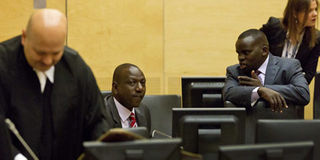Second witness to begin testimony in Ruto case Monday

Kenya's Deputy President William Ruto speaks with former broadcaster Joshua Arap Sang ( R ) in the courtroom before their trial at the International Criminal Court (ICC) in The Hague on September 10, 2013. Photo/FILE
What you need to know:
- Court to release edited version of evidence given by first witness as AU set for talks on relationship with The Hague
The second prosecution witness in the trial of Deputy President William Ruto begins his testimony on Monday, the same day a version of the evidence given by Witness 536 will be released to the public.
ICC prosecutor Fatou Bensouda has lined up 22 victims and crime-based witnesses. In addition, she intends to call expert witnesses, including witness P-46, a Europe-based expert expected to provide a historical background to the violence in Rift Valley.
So far, information coming from the Trial Chamber is that the second witness will testify in public unless the judges order otherwise.
On Friday, the defence concluded the examination-in-chief of witness 536, described as “dual status” because she was both a witness and a victim of the Kiambaa church arson attack on January 1, 2008 in which 35 people who had sought refuge in the church were burnt alive at the peak of the post-election violence.
The last day of her testimony went on until 6pm Dutch time after the court directed that she wraps up her testimony which began on September 17.
The witness did not testify on September 18 after it emerged that some individuals had attempted to reveal her identity and intimidate her family. Her testimony was delivered in closed sessions.
In addition, the Trial Chamber has also informed the parties that there will be sittings on Wednesday contrary to earlier indications of a possible break to allow another chamber to use the courtroom.
The Trial Chamber is trying to make up for time lost during the one-week adjournment when Mr Ruto travelled to Kenya in the wake of the Westgate terrorist attack in which 67 people were killed.
The trials of Mr Ruto and Mr Joshua arap Sang are unlikely to take another break until November 1 when there will be an adjournment, possibly until 2014 to pave the way for the start of the trial of President Uhuru Kenyatta on November 12.
Meanwhile, analysts have downplayed fears that members of the African Union (AU) will embark on a mass withdrawal from the International Criminal Court (ICC), after an emergency summit in Addis Ababa which starts on Monday.
The two-day AU meeting called by the governments of Kenya and Mauritania will be dedicated to discussing the bloc’s relationship with the ICC.
WITHDRAWAL
The gathering follows a motion passed by Kenya’s Parliament last month to withdraw the country from the ICC because of the trials of President Kenyatta, and his deputy, Mr Ruto. The decision has yet to be turned into a Bill, but Kenyan officials have been lobbying for a broader withdrawal of African states from The Hague-based court.
President Kenyatta and Mr Ruto have been charged alongside Mr Sang, a former journalist, with orchestrating the violence that erupted following the disputed presidential election of December 2007.
All three are charged with murder, persecution and forcible eviction of population. According to a report prepared by Mr Justice Philip Waki, 1,133 people were killed while 650,000 fled or were evicted from their homes during the violence.
The ICC has come under criticism from officials in Africa since President Kenyatta and Mr Ruto were elected in March. During Mr Kenyatta’s inauguration ceremony in April, Ugandan President Yoweri Museveni accused the court of “blackmail”.
The chairman of the AU, Ethiopian Prime Minister Hailemariam Desalegn, has accused the court of “hunting Africans”, a reference to the fact that the court is yet to open an investigation in any other part of the world.
In May, AU member-states voted 53 to one in favour of asking the ICC to drop the cases against the two leaders, so that they could instead be dealt with in Kenya’s national courts.
In July, the AU wrote to the court’s presidency to inform it of the bloc’s decision. The presidency of the court responded that such a request should be made directly to the judges in the two Kenya cases. The AU has yet to take further action on this.
In September, ICC judges accepted a request from Burundi, Eritrea, Rwanda, Tanzania, and Uganda to submit legal arguments to the court on why Mr Ruto should be allowed to miss hearings in his trial in The Hague to enable him to remain in Kenya.
All eight countries that currently have cases at the ICC are in Africa. Of those, five – Uganda, the Democratic Republic of Congo, Central African Republic, Ivory Coast and Mali – invited the ICC to investigate crimes that had occurred on their territory.
Crimes in Sudan and Libya were referred to the court by the United Nations Security Council. In Kenya, it was former ICC prosecutor Luis Moreno-Ocampo who initiated the investigation.
Thirty-four AU states are signatories to the ICC’s founding treaty, the Rome Statute.
In a speech to the UN General Assembly last week, Tanzanian President Jakaya Kikwete highlighted the AU’s dissatisfaction with the court.
“The ICC continues to ignore repeated requests and appeals by the African Union,” he said. “This attitude has become a major handicap that fails to reconcile the court’s secondary and complementary role in fighting impunity.”
He was referring to the fact that countries have primary jurisdiction over crimes committed on their territory.
The ICC can legally launch an investigation and bring prosecutions if a state is unable or unwilling to do so.



